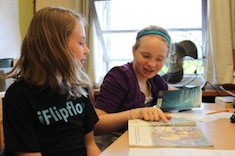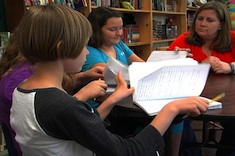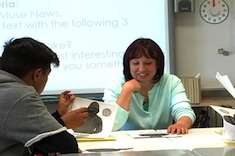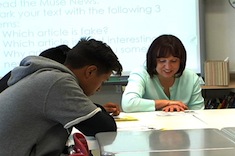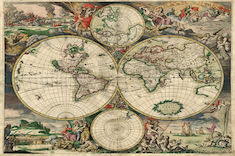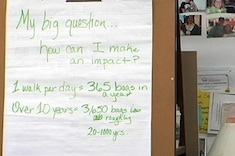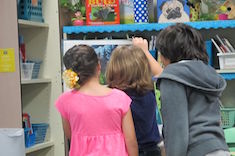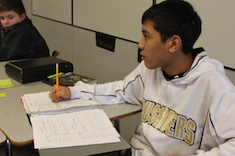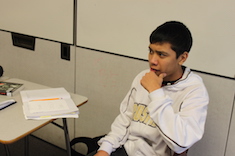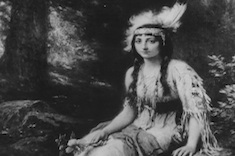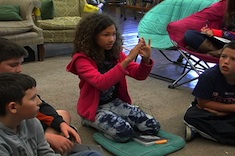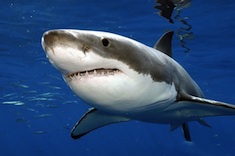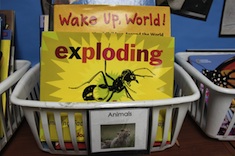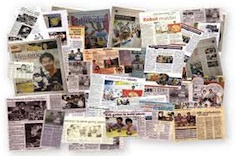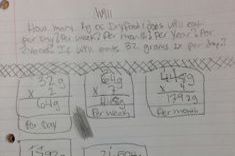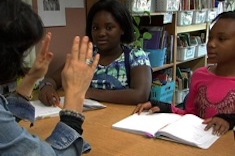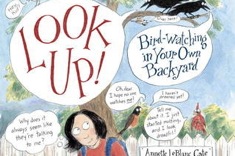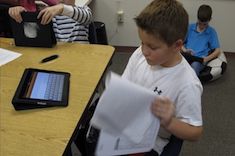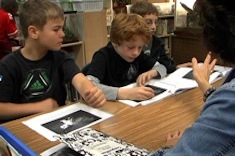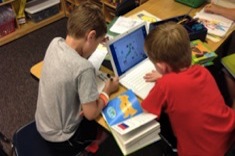Content Literacy
Reading and writing across the curriculum is sparking more interest than ever among teachers and school leaders. Here are the resources you need to build more writing into your math curriculum, more reading and talk into your science program, and especially, how to infuse more nonfiction texts into your teaching throughout the school day.
Latest Content
Research Through Picture Books
Katherine Sokolowski explains how picture books can be a potent tool for teaching intermediate students research skills.
Environmental Group Notes
Katherine Sokolowski meets briefly with a group of fifth-grade girls to go through the notes they are taking for their environmental studies project and talk through next steps.
Fact or Fiction? Introducing the Task
Christy Rush-Levine has her middle school students complete a fun and sophisticated reading activity using Muse magazine to sort through what might be fact or fiction. The piece includes a video excerpt from the group discussion.
Fact or Fiction? Discussion
Christy Rush-Levine has her middle school students complete a fun and sophisticated reading activity using Muse magazine to sort through what might be fact or fiction. In this second installment of the video series, students discuss the articles they have read.
Free-Range Learning with Nonfiction Part 2: Infographics and Maps
Andrea Smith shares the final installment of her series on the value of free-range learning in helping students explore nonfiction.
Minilesson on Facts and Sources
Katherine Sokolowski presents a minilesson on ferreting out facts while completing independent research projects.
Free Range Learning with Nonfiction (Part 1)
Andrea Smith's students explore nonfiction through free-range roaming. She explains how she sets up expectations and resources early in the year in this first installment of a two-part series.
Creating Curiosity with Story
Mark Levine finds that the secret to engaging students in what might be perceived as dry historical topics is to create curiosity with story.
The Daily Record
Mark Levine uses the “daily record” to encourage reflection throughout each day’s workshop in his social studies classroom.
The Pocahontas Ewww: Writing and Inquiry for Context
Mark Levine finds his middle school students are appalled by some of the cultural differences from times gone by, and shares how he fosters more understanding.
“What Are We Learning Today?”: Transitioning with Compelling Questions
Mark Levine helps his seventh-grade students transition to the learning of the day with a "compelling question" posted on the board before each class session.
Creating a Space for Peace
At a time of escalating violence throughout the world, children need peaceful spaces. Katie DiCesare creates a "peace table" in her first-grade classroom as a safe place for working through everything from playground squabbles to emotional distress.
Nonfiction Research Group in Fifth Grade
Katherine Sokolowski meets with a group of fifth graders who are all researching the use of nets in fishing and the environmental effects of the process. She works to build connections among classmates as well as research skills.
Digging into Research Questions
Melanie Meehan explains how helping students deepen their questioning strategies leads to more thoughtful research projects.
#articleaday
Justin Stygles uses a daily nonfiction article activity as a way to build interest in nonfiction short texts, especially among reluctant readers in his classroom.
New and Improved Nonfiction
Jennifer Schwanke remembers the days when mimeographed nonfiction pieces were rare and not welcome additions to elementary classrooms, and reflects on how much has changed.
Modeling Nonfiction Writing for English Language Learners: Part 3
Stella Villaba models nonfiction writing for her first- and second-grade English language learners, and in the process integrates vocabulary instruction into her lesson. This is the final video in a three-part series.
Strategies for Elaboration in Opinion Writing
Melanie Meehan works with fifth graders who are struggling to elaborate on themes in their opinion writing.
Wonder and React
How do you scaffold students for independent work? Melanie Meehan finds Wonder and React is a great strategy to use with fifth graders during an information writing unit.
Extended Inquiry with Article of the Week
Gretchen Schroeder finds the article of the week activity is an excellent vehicle for learning about content literacy gaps in student background knowledge and how to fill them.
“Giving Ourselves Hard Problems”: Rethinking Math Workshop
Mary Lee Hahn rethinks her math workshop structure to more closely align with the choice and problem solving in her reading and writing workshops.
The Intersection of Social Studies and Language Arts
Melanie Meehan writes about how teachers in her state are dealing with the time-crunch issue in social studies instruction by naturally integrating more social studies into the language arts program.
Owl Research Brainstorming: Partner Work
Andrea Smith’s fourth graders are working on an Owl Research project that integrates reading, writing, talking, listening, and content literacy.
Nonfiction Books with More Than One Entry Point
Franki Sibberson shares some of her favorite nonfiction books with more than one entry point.
Nonfiction Scrapbooks
Justin Stygles finds Nonfiction Scrapbooks are a fun way for his fifth-grade students to explore their reading interests and artistic talents with the classroom community.
Connecting Literacy and Math (PODCAST)
This podcast with Kassia Omohundro Wedekind explores connections between literacy and math instruction, particularly in the areas of strategies, problem-solving, and narrative abilities.
We Are All Writers with Louise Borden (PODCAST)
In this podcast, author Louise Borden talks about writing from a historical viewpoint.
Note Taking for Research
Katherine Sokolowski helps her fifth graders build notetaking skills for research.
Owl Research Notes Group
Andrea Smith helps a group of boys take notes during an owl research project.
Supporting Readers with Nonfiction Text
Cathy Mere finds that criteria for “just-rightness” varies with genre.
Browse Content By
Type
Category
- Assessment Tools
- Big Fresh Archives
- Booklists
- Choice Numeracy
- Classroom Design
- Common Core
- Community Building
- Conferring
- Content Literacy
- Digital Literacy
- English Language Learners
- Equity
- Family Relations
- Free Samples
- Guiding Groups
- Leadership
- Literacy Coaches
- Mentor Texts
- Minilessons
- New Teacher Mentors
- Podcasts
- Poetry
- Quote Collections
- Reading Strategies
- Self Care
- Struggling and Striving Learners
- Talking and Listening
- Teacher Study Groups
- Teaching Reading
- Teaching Writing
- Word Study and Vocabulary
Author
- Melissa Quimby
- Nawal Qarooni
- Gwen Blumberg
- Julie Cox
- The Lead Learners
- Hannah Tills
- Josie Stewart
- Ruth Metcalfe
- Mallory Messenger
- Becca Burk
- Jodie Bailey
- Vivian Chen
- Mary Brower
- Tiffany Abbott Fuller
- Stephanie Affinito
- Ruth Ayres
- Leigh Anne Eck
- Heather Fisher
- Shari Frost
- Julie Johnson
- Suzy Kaback
- Gigi McAllister
- Shirl McPhillips
- Melanie Meehan
- Cathy Mere
- Debbie Miller
- Tara Barnett and Kate Mills
- Tammy Mulligan
- Dana Murphy
- Bitsy Parks
- David Pittman
- Brenda Power
- Heather Rader
- Matt Renwick
- Mandy Robek
- Christy Rush-Levine
- Gretchen Schroeder
- Jen Schwanke
- Brian Sepe
- Katherine Sokolowski
- Stella Villalba
- Jennifer Vincent
Grade Level
Choice Literacy Membership
Articles
Get full access to all Choice Literacy article content
Videos
Get full access to all Choice Literacy video content
Courses
Access Choice Literacy course curriculum and training

